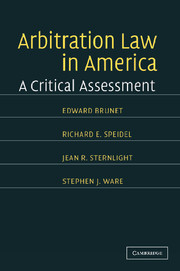Book contents
- Frontmatter
- Contents
- Acknowledgments
- Introduction
- 1 The Core Values of Arbitration
- 2 Common Legal Issues in American Arbitration Law
- 3 The Appropriate Role of State Law in the Federal Arbitration System: Choice and Preemption
- 4 Interstate Arbitration: Chapter 1 of the Federal Arbitration Act
- 5 Consumer Arbitration
- 6 International Commercial Arbitration: Implementing the New York Convention
- 7 Tension Points: Where the Authors Disagree
- Appendices
- Index
5 - Consumer Arbitration
Published online by Cambridge University Press: 16 November 2009
- Frontmatter
- Contents
- Acknowledgments
- Introduction
- 1 The Core Values of Arbitration
- 2 Common Legal Issues in American Arbitration Law
- 3 The Appropriate Role of State Law in the Federal Arbitration System: Choice and Preemption
- 4 Interstate Arbitration: Chapter 1 of the Federal Arbitration Act
- 5 Consumer Arbitration
- 6 International Commercial Arbitration: Implementing the New York Convention
- 7 Tension Points: Where the Authors Disagree
- Appendices
- Index
Summary
INTRODUCTION
The use of arbitration in the consumer context in the United States has been highly controversial. As one consumer organization put it: Mandatory, pre-dispute binding arbitration clauses in consumer contracts “are the single biggest threat to consumer rights in recent years, a de-facto rewrite of the Constitution that undermines a broad range of consumer protections painstakingly built into law.” The President of another consumer protection organization similarly stated: “[T]he use of mandatory pre-dispute arbitration clauses presents a grave problem for consumer rights and public safety.” This chapter will examine the nature and origin of this form of arbitration, why it has been so controversial, how it has been regulated to date, and what if any further regulation is desirable.
As has been discussed in Chapters 1 and 2, arbitration was traditionally agreed to, knowingly, by two or more business entities. Such businesses voluntarily traded the formality and publicity of litigation for the potentially cheaper, quicker, and more expert arbitration.
Historically, consumers and businesses did not enter into arbitration agreements with one another in the United States. Indeed, to the limited extent that the possibility of such arbitration was considered by Congress in 1925, when it passed the FAA, those few who spoke on the issue made clear that they did not view such a use of arbitration as appropriate.
- Type
- Chapter
- Information
- Arbitration Law in AmericaA Critical Assessment, pp. 127 - 184Publisher: Cambridge University PressPrint publication year: 2006
- 6
- Cited by



